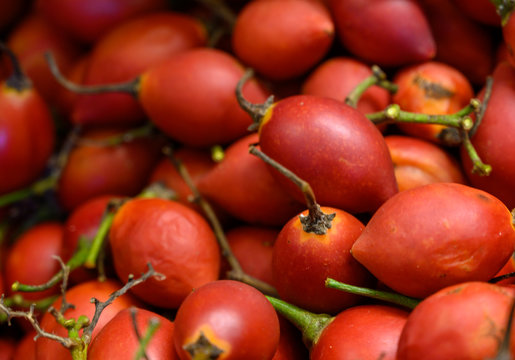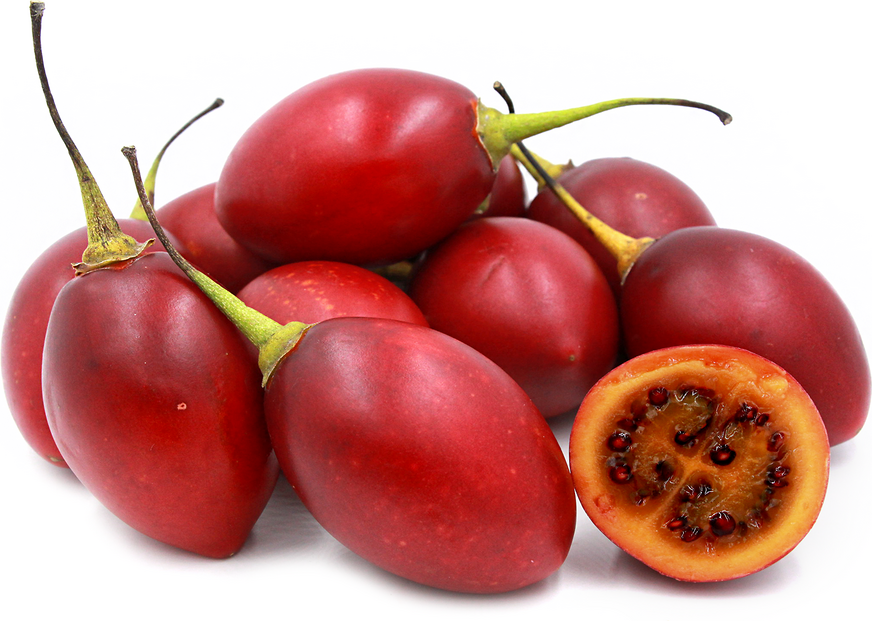Tomate de arbol, commonly known as the tree tomato or tamarillo, is a unique fruit that has piqued the interest of health enthusiasts and culinary experts alike. Native to the Andes mountains of South America, it has become a staple in Ecuadorian cuisine and is gaining popularity around the world for its tangy flavor and potential health benefits. In this article, we explore the nutritional wonders of tomate de árbol and why it should be included in your diet.
What is Tomate de Árbol?
Tomate de arbol (Cyphomandra betacea) is a small, oval-shaped fruit with smooth, shiny skin that ranges in color from yellow to deep red or purple. It grows on a fast-growing, woody shrub or small tree that can reach up to 15 feet tall. The fruit’s flesh is juicy and contains a multitude of small, edible seeds. Its flavor is often described as a blend between a tomato and a passionfruit, with a slight hint of bitterness.
Tomate de Árbol in Ecuadorian Cuisine
In Ecuador, tomate de árbol is a beloved ingredient used in a variety of dishes. It’s often blended into fresh juices, sauces, and is even used as a base for traditional soups. The fruit’s unique flavor complements both sweet and savory recipes, making it a versatile addition to any meal.
Cual es el Tomate de Árbol en USA?
For those wondering “cual es el tomate de árbol en USA?” or “what is the tomate de árbol in the USA?”, it’s commonly referred to as tamarillo. Although not as widely available as in South America, it can be found in some specialty grocery stores, particularly those that cater to Latin American clientele.
Nutritional Profile of Tomate de Árbol

Tomate de árbol is not only flavorful but also packed with nutrients. It’s a rich source of vitamins, minerals, and antioxidants that can support overall health.
Vitamins and Minerals
The fruit is an excellent source of vitamins A, C, and E, which are crucial for maintaining healthy skin, vision, and immune function. It also contains B-complex vitamins, including niacin and thiamin, which are important for energy metabolism. In terms of minerals, tomate de árbol provides potassium, magnesium, and iron, which are essential for cardiovascular health, muscle function, and oxygen transport, respectively.
Antioxidants
Tomate de árbol is loaded with antioxidants, such as anthocyanins, flavonoids, and carotenoids. These compounds help neutralize free radicals, which can cause oxidative stress and contribute to chronic diseases, including cancer and heart disease.
Health Benefits of Tomate de Arbol
The unique combination of vitamins, minerals, and antioxidants in tomate de árbol offers several health benefits.
Boosts Immune Health
Rich in vitamin C, tomate de árbol can help strengthen the immune system and increase resistance to infections. Vitamin C is also known for its anti-inflammatory properties, which can alleviate symptoms of conditions like asthma and osteoarthritis.
Promotes Healthy Vision
The high levels of vitamin A in tomate de árbol are vital for maintaining good eyesight. Vitamin A helps protect the eyes from age-related degeneration and night blindness.
Supports Heart Health
With its potassium content, tomate de árbol can help regulate blood pressure levels and prevent hypertension. The fiber in the fruit also aids in reducing cholesterol levels, further supporting heart health.
Aids in Digestion
The dietary fiber found in tomate de árbol is beneficial for digestion. It helps prevent constipation, promotes regular bowel movements, and may reduce the risk of colorectal cancer.
Helps Manage Weight
Low in calories and high in fiber, tomate de árbol is a great addition to weight management diets. The fiber keeps you feeling full longer, reducing the likelihood of overeating.
Skin Health
Vitamin E and antioxidants in tomate de árbol can contribute to healthy, glowing skin. These nutrients help protect the skin from damage caused by UV rays and pollution.
How to Incorporate Tomate de Árbol into Your Diet
Tomate de árbol can be enjoyed in various ways, from eating it raw to incorporating it into recipes. Here are a few ideas:
Fresh Juices and Smoothies
Blend tomate de árbol with other fruits for a nutritious and refreshing juice or smoothie. Add a bit of sweetness with honey or sugar to balance its tartness.
Sauces and Soups
Use tomate de árbol to create flavorful sauces for meat dishes or as a base for soups. Its tangy taste adds depth to any recipe.
Salads and Sandwiches
Chop the fruit and add it to salads or sandwiches for an extra burst of flavor and nutrition.
Preserves and Jams
Tomate de árbol makes delicious preserves and jams that can be spread on toast or used as a topping for desserts.
Preparing and Storing Tomate de Árbol
When selecting tomate de árbol, look for fruits with bright, unblemished skin. They should be firm but give slightly under pressure, indicating ripeness. To prepare, simply wash the fruit, cut it in half, and scoop out the flesh.
For storage, keep unripe fruits at room temperature until they ripen. Once ripe, store them in the refrigerator to extend their shelf life. Tomate de árbol can also be frozen for long-term storage. Just remove the skin and seeds, and freeze the flesh in airtight containers.
Potential Side Effects
While tomate de árbol is generally safe for consumption, some people may experience allergic reactions, especially those with latex-fruit syndrome.
Conclusion
Tomate de arbol is a nutritious fruit that offers a myriad of health benefits. From boosting immune health to aiding in digestion, its rich nutrient profile makes it a worthy addition to your diet. Whether you enjoy it in its raw form or use it to elevate your cooking, this exotic fruit is sure to leave a lasting impression on your taste buds and your health.
If you’re looking to try tomate de árbol, remember to check specialty grocery stores or Latin American markets. By incorporating this superfruit into your meals, you’ll not only enjoy its unique flavor but also reap the many health benefits it has to offer.
For more information, visit: Clochant




